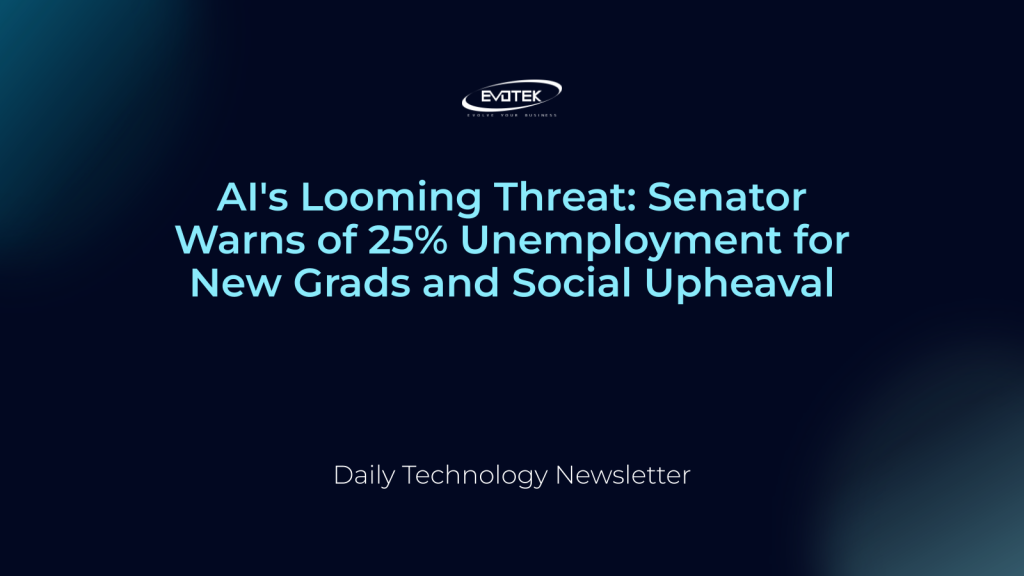Recent graduates face an increasingly challenging job market, marked by persistent economic uncertainties and a post-pandemic landscape. Many young professionals, navigating social media shifts, global health crises, and political volatility, now confront one of the most difficult entry-level job markets in over a decade.
The Federal Reserve reports current unemployment among recent graduates at 9.3%—its highest level since 2014, excluding the pandemic era. However, U.S. Senator Mark Warner (D-Va.) warns this could be merely the calm before a significant storm.
AI’s Impact on the Future Workforce
In a stark interview with Bloomberg, Senator Warner projected that unemployment for recent college graduates could skyrocket to an alarming 25% within the next two to three years. Such a surge, he cautioned, risks triggering an “unprecedented” level of social disruption across the nation.
“If we eliminate that front end of the pipeline, how are people ever going to get to that mid-career spot?” Warner further questioned in an interview with CNBC, highlighting a critical concern about career progression and economic stability for a generation.
Legislative Efforts and Industry Accountability
Recognizing the profound economic implications, Senator Warner is actively pursuing solutions. He revealed plans for a comprehensive job retraining program, advocating that the Artificial Intelligence (AI) companies, which he believes are driving this disruption, should bear the majority of the associated costs.
Collaborating across the political aisle, Warner partnered with Senator Josh Hawley (R-Mo.) to introduce a pivotal bill. This proposed legislation would mandate major corporations and federal agencies to report all AI-related job effects, including layoffs and displacement, directly to the Department of Labor. The department would then publish these findings to Congress and the public, providing crucial transparency.
Senator Hawley emphasized the urgency, stating, “Artificial intelligence is already replacing American workers, and experts project AI could drive unemployment up to 10-20% in the next five years.” He stressed the necessity for “an accurate understanding of how AI is affecting our workforce, so we can ensure that AI works for the people, not the other way around.”
While Senator Warner acknowledges AI’s potential to generate new job opportunities in the long term, he underscored that the interim transition period could inflict severe economic hardship if Congress fails to implement proactive measures.
Wider Concerns: AI’s Broad Economic Disruption
The apprehension surrounding AI’s job displacement extends beyond entry-level positions. Senator Bernie Sanders (D-Vt.) released a report last month forecasting that technological automation, including AI, could eliminate nearly 100 million jobs across the U.S.
Sectors most vulnerable to significant disruption include fast food, customer service, and various labor roles. Surprisingly, even high-skilled professions such as accounting, software development, and nursing could face substantial cuts.
Senator Sanders articulated a deeper societal concern in an op-ed for Fox News: “It’s not just economics. Work, whether being a janitor or a brain surgeon, is an integral part of being human. The vast majority of people want to be productive members of society and contribute to their communities. What happens when that vital aspect of human existence is removed from our lives?”
Navigating Policy and the Road Ahead
Despite multiple congressional hearings on AI safety and its economic impact, Capitol Hill’s approach remains uncertain. Senator Warner expressed skepticism about lawmakers reaching consensus on meaningful AI legislation.
Further complicating potential federal action, reports suggest the Trump administration is considering an executive order that would preemptively block states from regulating AI. Warner vehemently warned against such a move: “If we take away the pressure from the states, Congress will never act.” He drew a parallel to past legislative inaction: “Let’s look at the fact we never did anything on social media. If we make that same response on AI and don’t put guardrails, I think we will come to rue that day.”
As the debate unfolds, the challenge for policymakers lies in crafting effective strategies to harness AI’s benefits while mitigating its potential to disrupt human livelihoods and societal stability.

 日本語
日本語 한국어
한국어 Tiếng Việt
Tiếng Việt 简体中文
简体中文